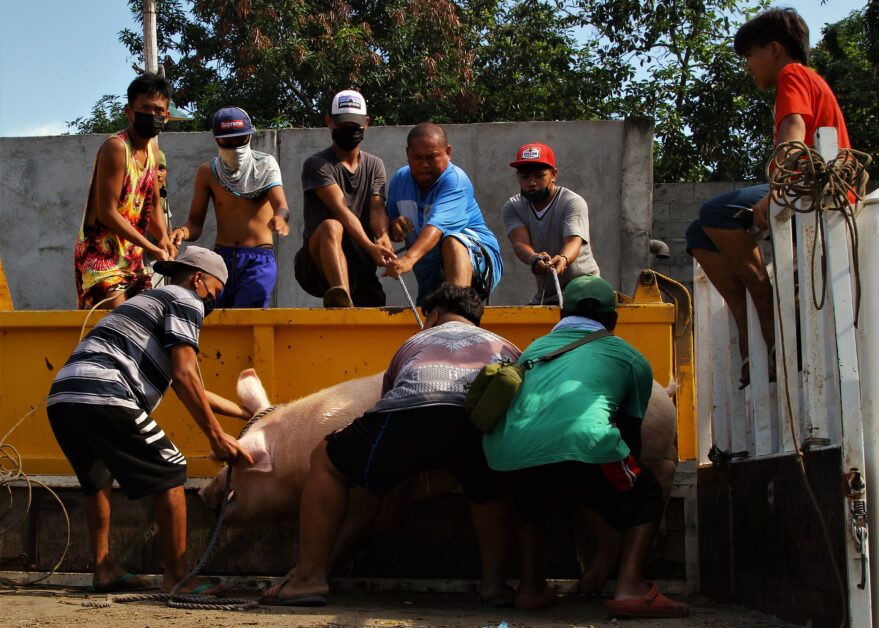
GENERAL SANTOS CITY (MindaNews / 07 August) – Authorities in Cotabato province rush to contain the rising cases of African Swine Fever (ASF) as the dreaded hog disease is back anew in its third wave, threatening once again the over a billion-peso hog industry in that province.
Citing reports from the Provincial Veterinary Office, Cotabato Governor Emmylou Mendoza on Tuesday, August 6, said that thousands of pigs were found positive to ASF in at least 49 barangays in Kidapawan City and in nine other towns in the province. The hog disease was detected to have recurred two months ago.
Aside from Kidapawan City, also affected by ASF were the towns of M’lang, Matalam, Makilala, Antipas, Midsayap, Pigcawayan, Tulunan, President Roxas, Kabacan and Arakan. Cotabato has 17 towns.
In a local media interview on August 5, Eliseo Mangliwan, Cotabato ASF focal person, said the province has so far incurred losses of at least P50 million. Almost 5,000 pigs found positive with the disease were culled, he added.
Appraised about the gravity of the issue during a meeting with local officials and stakeholders, Mendoza urged local executives and other leaders to impose restrictions on border control and biosecurity measures in order to thwart the spread of ASF in their respective localities.
Mayors’ call
Several town mayors have ordered a ban on the transport of hogs and pork – either cooked or processed/unprocessed – especially to and from villages that were listed to have ASF positive cases.
“We must take decisive actions and not allow what happened in 2022 and 2019 to be repeated and again threaten our hog industry,” Mendoza said.
In Kidapawan City, the local government unit offered to buy ASF-free hogs at P140 a kilo to help cushion the impact of the ASF to backyard hog raisers. A P3.7-million fund is on standby for this initiative, Kidapawan Mayor Jose Paolo Evangelista said.
In Midsayap, Mayor Rolando Sacdalan said hog raisers in two upland communities voluntarily culled their infected hogs. The mayor said they have barred the entry and egress of hogs, pork and its by-products in the affected villages.
Antipas municipal officials have declared the town under a state of calamity on July 29 due to ASF. The Department of Trade and Industry was tasked to implement a 60-day price freeze on basic commodities.
On August 5, Cotabato-based former agriculture secretary Emmanuel Piñol bared on social media that Mamitas Farm in Makilala town, the biggest hog farm in the province owned by a friend, already lost more than 2,000 hogs to ASF.
“This is the biggest number of hogs infected by ASF in one farm which could seriously affect the supply of meat in the province, especially with the coming holidays,” Piñol said.
Hardest hit were backyard hog raisers who do not have sufficient bio-security facilities to protect their farms from the spread of ASF.
Stiff penalties
Officials are contemplating on coming up with stiff penalties and punishment aimed at those who continuously defy ASF restrictions. “What these violators do is tantamount to economic sabotage,” Mangliwan said.
He pointed out that the lack of proper understanding and non-cooperation of some residents on what needs to be done to stop the ASF spread have contributed to the worsening situation.
Despite restrictions on the movement of hogs, pork and its by-products to help contain ASF, there are those who attempt to sneak out hogs and pork products, unmindful of the dire consequences of their actions, he said.
According to the official, some residents who fear incurring losses, slaughter their pigs secretly and sell these elsewhere.
“There were even monitored incidents of dead pigs being thrown into rivers, endangering contamination of places not affected by ASF,” he said. (Rommel Rebollido / MindaNews)
0 Comments